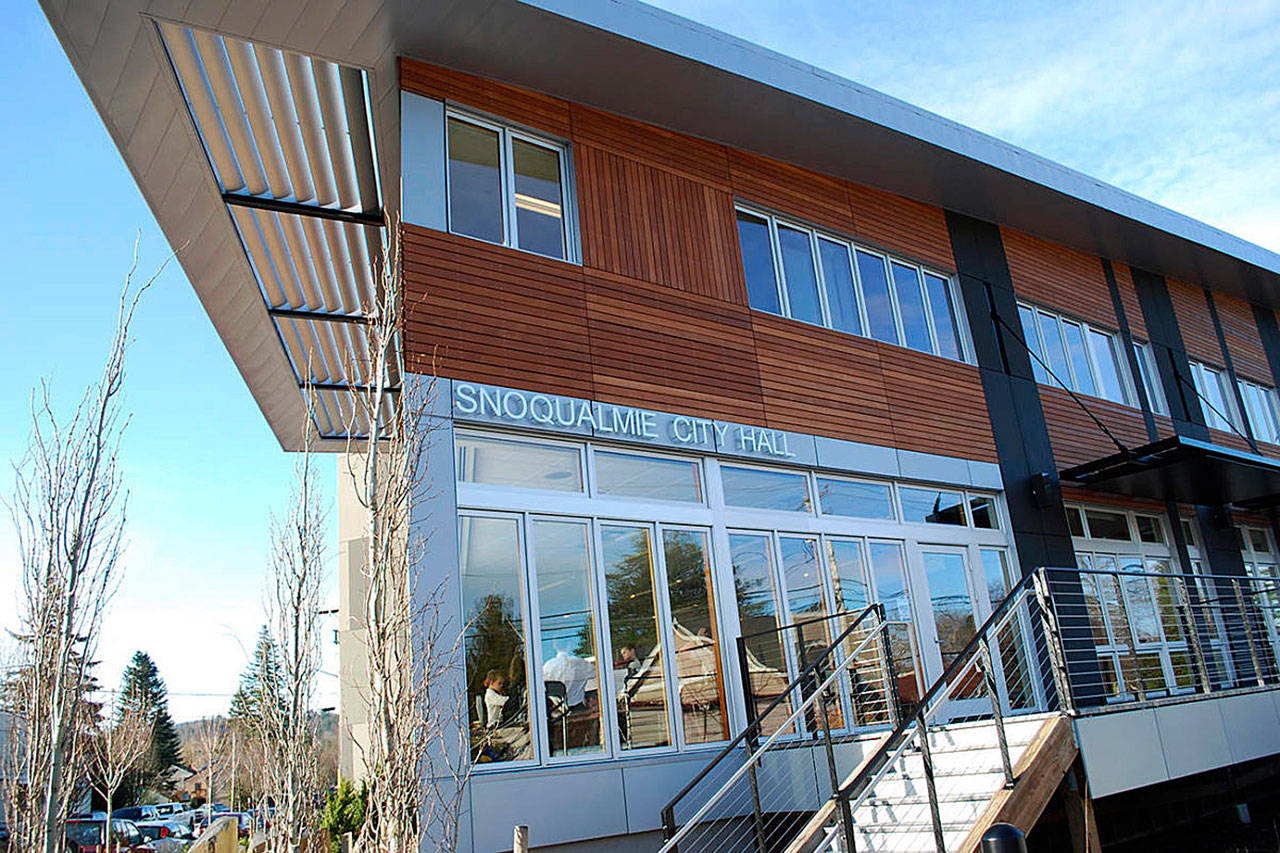The city of Snoqualmie is in the process of undergoing biennial budget review, and has opted not to increase property tax rates going into the new year. At its Nov. 25 meeting the Snoqualmie City Council adopted two ordinances related to property taxes in 2020, and amended the proposed property tax increase to zero in a split vote.
The two ordinances proposed were an increase ordinance to increase the 2019 levied amount by 1.11 percent (including the capacity banked last year), and an ordinance certifying the regular and excess property taxes to the King County Assessor’s Office (AB19-141).
Unlike what was originally recommended by the administration, the council amended the increase ordinance from 1.11 percent to zero percent.
The amendment to decrease the property tax increase to zero passed four to three, with councilmembers Katherine Ross, James Mayhew and Sean Sundwall voting against. The ordinance then, as amended, passed four to three, with councilmembers voting the same.
The second ordinance, with new numbers quickly calculated after the passing of the first, then was unanimously adopted.
There will be no additional increase in the rate at which the city will collect property taxes in 2020. Mayor Matt Larson said this is the first time there will be no increase in that rate in many years.
This does not guarantee that Snoqualmie residents won’t experience a change in their overall bill. Only a small portion of each person’s property tax bill is collected by the city and other jurisdictions collect property taxes, including King County and the Snoqualmie Valley School District. Additionally, rates change with property values, and the total amount collected by the city is shared by all property owners, with houses with a higher assessed value paying a higher rate and houses with a lower assessed value paying a lower rate.
The proposed property tax levy had been under discussion and saw two presentations given by city of Snoqualmie budget analyst Drew Bouta, first at a Nov. 12 public hearing and then again at the Nov. 25 meeting.
According to the agenda bills in the meeting’s packet, the proposed 1.1 percent levy increase was equal to $89,478. When divided by the total assessed valuation for the city of Snoqualmie, the increase would have added approximately $0.025 per $1,000 of assessed valuation.
Bouta explained that if the increase ordinance passed, as written, the average property owner in Snoqualmie, with the average property assessed value equaling $700,000, could expect to see an estimated $17.60 increase in city property taxes for the entire year, about $1.50 per month.
It was recommended that the city use the amount of regular property tax collected to fund important services such as police, fire, and parks maintenance. Given the inclusion of the 1 percent levy increase in the development of the 2019-2020 biennial budget, the cost-of-living adjustments included in both the Teamsters, International Association of Firefighters, and Snoqualmie Police Association collective bargaining agreements, general inflation, and the risk of state shared revenue diversion, Bouta said the exercise of the 1.11 percent levy increase was crucial.
“Property tax revenues acrue to the general fund and the general fund supports important maintenance such as pothole repairs, and the near daily upkeep of parks, and services such as police and fire,” Bouta said. “In order to sustain these services over the next year the 1.11 percent increase is prudent.”
But that didn’t happen.
Councilmembers voiced strong arguments both for and against the proposed property tax increase.
“I am not a taxing person. I’m not a person who believes in taxes and taxing your way out of a problem,” said Councilmember Matthew Laase. “So as I did last year I advocate for council to find $89,000 somewhere else and not burden the citizens of Snoqualmie with additional taxes.”
Some cited concerns that not increasing the tax revenue would lead to future staff cuts, while others mentioned that the city is in a good position financially. Others still spoke of financial difficulties that could be inflicted on low income residents. One even pointed out that people say they are tired of paying taxes.
“We can only collect 89,000 and that’s going to be divided amongst however many households we have in the city, and for some it’s going to be more, and for some it’s going to be less. I get that,” Councilmember Sundwall said. “But I don’t know any other way unless we’re going to cut staff. So, unless we have a volunteer, I don’t know what that looks like. And I do not think that we are overstaffed in this city.”
Councilmember Bryan Holloway mentioned a surplus in the city’s general fund and that they might even put some of that money toward the city’s new community center project.
“There’s more than one citizen out there, when they focus on what we’re considering, saying we pay too much taxes — you can’t raise taxes anymore,” said councilmember Bob Jeans.
They also discussed options for property tax relief for senior citizens, citizens with disabilities, and low income citizens.
Earlier in the meeting, a brief public hearing on the budget was held. The council decided to push the discussion of the budget to a future meeting. They are expected to take action on ordinances amending the 2019-2020 biennial budget this month.
To learn more about the property tax ordinance, view additional information in the council meeting agenda packet (https://www.ci.snoqualmie.wa.us/496/Council-Agenda) online or by watching the video of the meeting on YouTube.


